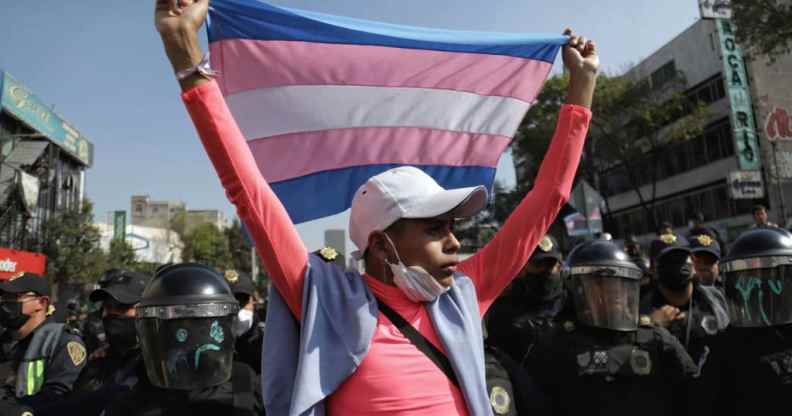Mexico issues first birth certificate with non-binary gender marker: ‘It is a collective achievement’

A trans activist demonstrates against transphobia in Mexico City, Mexico. (Fernanda Rojas / Eyepix Group/Barcroft Media via Getty Images)
An LGBT+ activist has become the first person in Mexico to be issued a birth certificate legally recognising them as non-binary in a landmark legal victory.
The central Mexican state of Guanajuato issued the certificate to Fausto Martinez, a 26-year-old law student, after a year-long battle for the right to list “NB” on their official identification documents.
Last September, Martinez pushed for identity documents that reflect their identity through the National Electoral Institute (INE). The agency, which organises federal elections, refused.
In Mexico, birth certificates are issued by each state’s civil registry office, so Martinez took their case to the Civil Registry of Guanajuato. They refused.
Martinez refused, too – to be defeated, that is. With the help of Amicus, a state-level LGBT+ advocacy group, they lodged an injunction against the registry office in the town of León in November.
And on 11 February, Martinez finally won his amparo lawsuit, Mexico’s constitutional appeals process. Meaning that, in the eyes of the law, they are legally non-binary in what activists said was a first for the nation.
In a Twitter thread, they shared a photograph of their amended birth certificate and detailed the often fraught journey to get there.
“I have always said that what is named does not exist,” they wrote. “For this reason, the transience of this fact, the Mexican state recognises that non-binary people exist and with that, we are subject to rights and obligations.”
Les comparto que el pasado 11 de febrero recibí mi acta de nacimiento NB. Les cuento un poco como fue el proceso. pic.twitter.com/biz6RkgkYQ
— Fausto Martínez (@FaustoGlow) February 16, 2022
The INE initially declined to tweak Martinez’s sex marker to non-binary because neither the birth certificate nor their Clave Única de Registro de Población (CURP), a unique identification code given to residents, specify their gender.
So Martinez quickly sought help from Juan Pablo Delgado, Amicus’ executive director, who helped her draw up an appeal through to the fourth district court’s judgment in León.
But thanks to the court’s ruling, this means Martinez’s CURP, tax identification number and social security codes may also be changed.
“It is a collective achievement of non-binary people in Mexico, that our existence is legally recognized with all that that implies, making us a legal entity with rights and obligations,” Martínez told Mexican news agency EFE.
While Amicus “celebrated” the judge’s decision in a social media statement, the group stressed that it is the exception, not the rule.
Campaigners cautioned other non-binary Mexicans that the path to Martinez’s NB marker was only paved by “exhausting” courts that only have jurisdiction in Guanajuato, not elsewhere in the country.
More than half of Mexico’s 32 states have passed legislation to allow trans people to change their gender on official documents, such as passports and driver’s licences.
In 2019, Mexico’s top court ruled that trans people must be issued an updated birth certificate following their gender affirmation surgery. The Supreme Court intervened after state officials denied a trans people legal transition.
For many trans and non-binary Mexicans, however, such changes in the law are a cold comfort given that bigotry and hate crimes remain a harsh reality in their lives.
Mexico has for years been the second-deadliest country in the world for trans people, according to groups monitoring transphobic violence.

